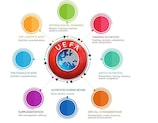UEFA nutrition initiative supports players
Friday, February 16, 2018
Article summary
Proper nutrition is vital for a footballer's health and performance ─ and this has led to a new UEFA initiative, ‘The 2018 UEFA Football Nutrition Consensus’, to help support players.
Article top media content

Article body
At the 2018 UEFA Medical Symposium, held between 30 January and 1 February in Athens, Greece, a new initiative was presented and outlined to the 230 participating delegates: ‘The 2018 UEFA Football Nutrition Consensus’.
Why is nutrition important for the footballer?
Good nutrition choices can support the optimal health and performance of players. The intake, type, quantity and timing of foods, fluids and certain supplements, can optimise preparation, performance and recovery of players for matches and training sessions.
Why do we need a consensus?
Unfortunately, there are no clear, comprehensive and up-to-date guidelines for football teams to follow when it comes to supporting their players through good nutritional choices. In fact, the last official football nutrition consensus was published in 2006, and over a decade on, there has been a huge growth in nutrition research that is applicable to football. With concurrent evolutions in the physiological demands during football matches and training sessions, it is integral that nutrition strategies also need to evolve to fuel players to meet these demands. This created a clear need for an updated consensus to establish best practice guidelines and improve player care.
How does the consensus process work?
For the consensus, UEFA brought together a group of 23 of the world’s leading expert applied researchers and practitioners from different countries and associations, to address some of the key themes within the modern game.
These include:
- Nutrition requirements to promote fuelling, recovery and adaptation to both training and matches during different phases of the season.
- Strategies to support rehabilitation, immunity, travel, extreme environments (hot, cold, altitude) and cultural considerations within elite teams.
- Specialised sections highlighting the specific considerations for the female and junior players are also included.
- Guidelines for the safe use of evidence-based supplementation. Guidance will also be provided on this growing area within the game.
The contributing group is currently working on the consensus, and supporting practical guidelines, which will be published in a leading sports and exercise medicine journal in the summer of 2018.
The full list of contributors can be found here
